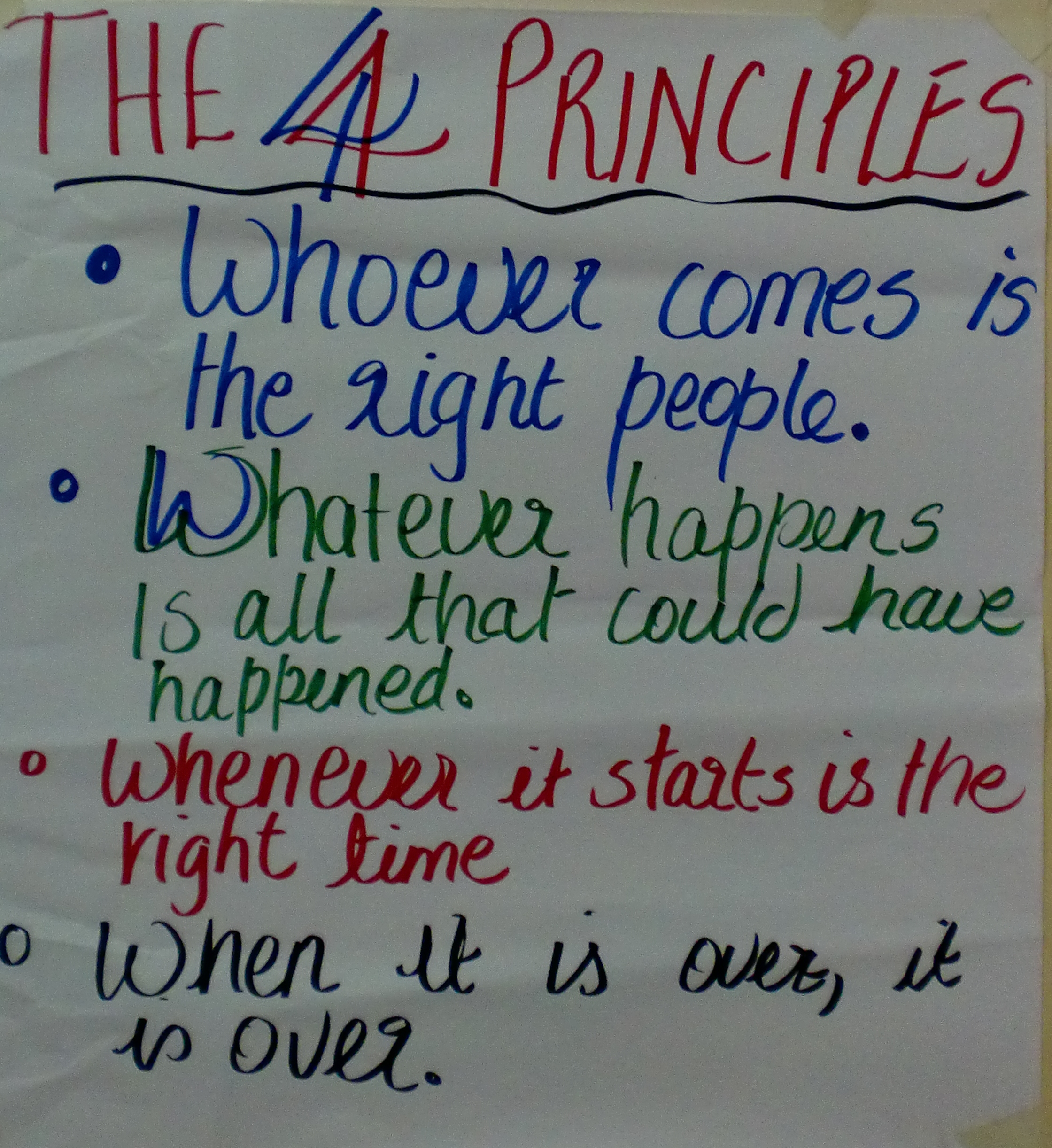"Don't you see, it is really an extraordinary thing that you are so afraid to be what you are.; because beauty lies in being what you are. If you see that you are lazy, that you are stupid and if you understand laziness and come face to face with stupidity without trying to change it into something else, then in that state you will find there is an enormous release, there is great beauty, there is great intelligence."
Think on these things - chapter: The attentive mind
In response to the question: "Why do I hate myself when I don't study"
Wednesday, September 22, 2010
Friday, September 17, 2010
Cross-cultural awareness, competences and other related jargon. Training ideaS
I am reproducing an interesting article about cross cultural training... It presents simply what is quite simple. Which is 1000 times better than what most so called expert do: making something simple complicate and trying to make sound simple the resulting complexities. None of this here. Thanks to the author whose website is mentioned below:
Terminology within the cross cultural communications field can sometimes be baffling to those reading the literature, websites or promotional material. Many ask what is the difference between 'intercultural' and 'cross cultural'? What is 'cross cultural awareness' as opposed to 'cross cultural knowledge' or, are 'cultural sensitivity' and 'cultural competence' the same thing?
With a view to clarifying some of the above mentioned terminology, this article will examine terms used in relation to building cross cultural understanding within the business world. Cross cultural understanding simply refers to the basic ability of people within business to recognise, interpret and correctly react to people, incidences or situations that are open to misunderstanding due to cultural differences.
The fundamental intention of cross cultural training is to equip the learner(s) with the appropriate skills to attain cross cultural understanding. Once the foundations of cross cultural understanding have been laid, the learner(s), either through continued training or experiences within the workplace, gradually attains a more acute appreciation of cultural differences.
The different types of appreciation are cross cultural knowledge, cross cultural awareness, cross cultural sensitivity and cross cultural competence. Although all the terms may appear similar in meaning, subtle differences exist between them. 'Cross Cultural Knowledge' is critical to basic cross cultural understanding. Without it cross cultural appreciation cannot take place. It refers to a surface level familiarization with cultural characteristics, values, beliefs and behaviours. 'Cross Cultural Awareness' develops from cross cultural knowledge as the learner understands and appreciates a culture internally. This may also be accompanied by changes within the learner's behaviour and attitudes such as a greater flexibility and openness. 'Cross Cultural Sensitivity' is a natural by-product of awareness and refers to an ability to read into situations, contexts and behaviours that are culturally rooted and be able to react to them appropriately. An suitable response necessitates that the actor no longer carries his/her own culturally determined interpretations of the situation or behaviour (i.e. good/bad, right/wrong) which can only be nurtured through both cross cultural knowledge and awareness.
'Cross Cultural Competence' is and should be the aim of all those dealing with multicultural clients, customers or colleagues. 'Competence' is the final stage of cross cultural understanding and signifies the actor's ability to work effectively across cultures. Cross cultural competency is beyond knowledge, awareness and sensitivity in that it is the digestion, integration and transformation of all the skills and information acquired through them, applied to create cultural synergy within the workplace.
Thanks for this valuable article taken from the following web http://www.kwintessential.co.uk/cultural-services/articles/cross-cultural-understanding.html
What seems to me is the importance of appreciation. The practice of appreciation is what will help seeing the intention beyond and connecting with what is really good in every thing. Culture is often the make up for wanting to do things properly. Because of the general positive inclination of any culture, this very trait is often used and abused by groups of people wanting to draw power and benefit from society - either by their position or by their business or practices. That is how culture or cultural features become degenerative - ie they lose their meaning and become mere instrument of power or control -. This is obvious in some rituals - often religious rituals whose meaning is lost - or some table manners - where to put our hands or forks or knife, whether using hands or not etc... -
A deep training directions would be look very seriously for as many reasons as possible why a behavior A is good and why its opposite A- is also good. Practicing that. Then practicing that on our personal top 10 of what we believe is right - right in business relationship - right at home - right with children - right with friend.
Then the same should be practice with someone else list. Before that, the "someone else" list should be "de-personnalised" ie it should be re-written by someone else (who would read it though) and following that, it should be placed in a box for someone else to pick it up randomely.
This technique would enhance the practice of appreciation, detachment, distinguishing between person and the behaviour. It would help de-personnalise issues while bringing to light the purest intentions (the top ten of what is right). It could create an "arch" of understanding - well above persons, ego and behaviours - under the light of pure intention and universal values, where we all stand equal and united.
Quite a high aim and surely an interesting training session.
Terminology within the cross cultural communications field can sometimes be baffling to those reading the literature, websites or promotional material. Many ask what is the difference between 'intercultural' and 'cross cultural'? What is 'cross cultural awareness' as opposed to 'cross cultural knowledge' or, are 'cultural sensitivity' and 'cultural competence' the same thing?
With a view to clarifying some of the above mentioned terminology, this article will examine terms used in relation to building cross cultural understanding within the business world. Cross cultural understanding simply refers to the basic ability of people within business to recognise, interpret and correctly react to people, incidences or situations that are open to misunderstanding due to cultural differences.
The fundamental intention of cross cultural training is to equip the learner(s) with the appropriate skills to attain cross cultural understanding. Once the foundations of cross cultural understanding have been laid, the learner(s), either through continued training or experiences within the workplace, gradually attains a more acute appreciation of cultural differences.
The different types of appreciation are cross cultural knowledge, cross cultural awareness, cross cultural sensitivity and cross cultural competence. Although all the terms may appear similar in meaning, subtle differences exist between them. 'Cross Cultural Knowledge' is critical to basic cross cultural understanding. Without it cross cultural appreciation cannot take place. It refers to a surface level familiarization with cultural characteristics, values, beliefs and behaviours. 'Cross Cultural Awareness' develops from cross cultural knowledge as the learner understands and appreciates a culture internally. This may also be accompanied by changes within the learner's behaviour and attitudes such as a greater flexibility and openness. 'Cross Cultural Sensitivity' is a natural by-product of awareness and refers to an ability to read into situations, contexts and behaviours that are culturally rooted and be able to react to them appropriately. An suitable response necessitates that the actor no longer carries his/her own culturally determined interpretations of the situation or behaviour (i.e. good/bad, right/wrong) which can only be nurtured through both cross cultural knowledge and awareness.
'Cross Cultural Competence' is and should be the aim of all those dealing with multicultural clients, customers or colleagues. 'Competence' is the final stage of cross cultural understanding and signifies the actor's ability to work effectively across cultures. Cross cultural competency is beyond knowledge, awareness and sensitivity in that it is the digestion, integration and transformation of all the skills and information acquired through them, applied to create cultural synergy within the workplace.
Thanks for this valuable article taken from the following web http://www.kwintessential.co.uk/cultural-services/articles/cross-cultural-understanding.html
What seems to me is the importance of appreciation. The practice of appreciation is what will help seeing the intention beyond and connecting with what is really good in every thing. Culture is often the make up for wanting to do things properly. Because of the general positive inclination of any culture, this very trait is often used and abused by groups of people wanting to draw power and benefit from society - either by their position or by their business or practices. That is how culture or cultural features become degenerative - ie they lose their meaning and become mere instrument of power or control -. This is obvious in some rituals - often religious rituals whose meaning is lost - or some table manners - where to put our hands or forks or knife, whether using hands or not etc... -
A deep training directions would be look very seriously for as many reasons as possible why a behavior A is good and why its opposite A- is also good. Practicing that. Then practicing that on our personal top 10 of what we believe is right - right in business relationship - right at home - right with children - right with friend.
Then the same should be practice with someone else list. Before that, the "someone else" list should be "de-personnalised" ie it should be re-written by someone else (who would read it though) and following that, it should be placed in a box for someone else to pick it up randomely.
This technique would enhance the practice of appreciation, detachment, distinguishing between person and the behaviour. It would help de-personnalise issues while bringing to light the purest intentions (the top ten of what is right). It could create an "arch" of understanding - well above persons, ego and behaviours - under the light of pure intention and universal values, where we all stand equal and united.
Quite a high aim and surely an interesting training session.
Saturday, September 4, 2010
Open space facilitation

Great, authentic sharing about practical 'Open space' facilitation:
Open space technology is an ‘innovation’ that has been created to provide a forum for development stakeholder interaction. It works by breaking away from the stilted western influenced ‘one-man shows’ where an ‘expert’ occupies a position of power, usually on a raised dais with, the others sitting in a square or semi triangular shape below him. In open space there is no boss and the no real rules of interaction. The format is meant to ensure everyone is able to interact with everyone else.
First the people sit in a circle.
There is a minimum of ceremony. The gathered people start by identifying the key issues that have brought them together. If several issues are identified then the circle will break into several smaller circles to discuss each of them and suggest solutions. A closing circle will later be created to bring all this input together. Everybody who wants to speak has a chance to do so. There are no titles here, no affectations and no honorifics. The cleaner sits shoulder to shoulder with the manager and the driver surprises everybody by her well reasoned and animated contributions. It is amazing how much openness and trust this simple but powerful tool brings.
Open space technology was created by Owen Hanson in the 1980’s as a methodology for conducting meetings. He acknowledges that, in developing the methodology, he was influenced by ‘his experience of life in an African village.’
Learning and facilitation. How to learn? How to teach? How to reach
It seems to me: learning how to teach is learning how to reach
I am impressed by the following metaphor when it comes to learning, reaching and reaching out: infusion / waiving. In future posts, I will elaborate on the analogies between these seemingly very different fields.
Infusion:
how to let a subject infuse? penetration, penetrability, diffusion, time and space of contact, mixing without disturbing, blending, getting the flavor, getting the essence...
Pictures below can help relate and bring us a little step further in elaborating a clearer notion of an "infusion-based learning and facilitation"




Waiving
The long process(es) - creating thread, dying, weaving, the shuttle, going up and down, the science involved (it is very exact in a way - it goes thread by thread - and if not exact, it will look awkward) , the long, gruesome, time-consuming practice of it and how it is learnt (passed on from mother to daughter - as some form of apprenticeship - and how it often reflects on someone's maturity level or level of preparedness - like in the case of a young bride who is completing her own work or tapestry, or as a matter of fact it could be batik though batik is not about weaving).
Buckminster Fuller in the Critical Path is making explicit allusion to weaving patterns of South East Asia and those weaving patterns that use tri-angular weaving (three points of contacts which make the pattern almost indestructible).






I am impressed by the following metaphor when it comes to learning, reaching and reaching out: infusion / waiving. In future posts, I will elaborate on the analogies between these seemingly very different fields.
Infusion:
how to let a subject infuse? penetration, penetrability, diffusion, time and space of contact, mixing without disturbing, blending, getting the flavor, getting the essence...
Pictures below can help relate and bring us a little step further in elaborating a clearer notion of an "infusion-based learning and facilitation"




Waiving
The long process(es) - creating thread, dying, weaving, the shuttle, going up and down, the science involved (it is very exact in a way - it goes thread by thread - and if not exact, it will look awkward) , the long, gruesome, time-consuming practice of it and how it is learnt (passed on from mother to daughter - as some form of apprenticeship - and how it often reflects on someone's maturity level or level of preparedness - like in the case of a young bride who is completing her own work or tapestry, or as a matter of fact it could be batik though batik is not about weaving).
Buckminster Fuller in the Critical Path is making explicit allusion to weaving patterns of South East Asia and those weaving patterns that use tri-angular weaving (three points of contacts which make the pattern almost indestructible).






Cross-Cultural Managment - Various concept and approaches
Cross-Cultural Management - Various concept and approaches
As part of our usual methodology, we explore the immediately-available material on the subject.
We try to cross a few approaches, from which we get a bigger picture understanding
We are then able to articulate what we believe is key to our own approach - namely the dimension of appreciation inter-linked with the various dimensions of communication especially listening, silence and questioning.
Below are some parts of the first step: understanding various approaches...
As part of our usual methodology, we explore the immediately-available material on the subject.
We try to cross a few approaches, from which we get a bigger picture understanding
We are then able to articulate what we believe is key to our own approach - namely the dimension of appreciation inter-linked with the various dimensions of communication especially listening, silence and questioning.
Below are some parts of the first step: understanding various approaches...
|
Subscribe to:
Posts (Atom)




